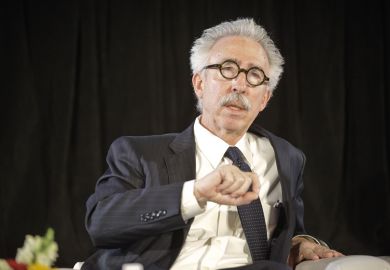University leaders in Illinois fear for the future of the state’s public higher education sector after going without an official state budget for almost two years.
Illinois has not had a full budget since July 2015 due to ongoing disagreements between the governor and the state legislature. While stopgap budgets have been provided for public higher education institutions since then, they have amounted to just a fraction of universities’ typical levels of funding.
State support for public universities in Illinois fell by 80 per cent per student between 2015 and 2016 to just $2,196 (£1,700), according to a report from the State Higher Education Executive Officers’ Association published last month.
Student numbers also declined by 11 per cent – or 46,000 – during that period, while university presidents say that institutions elsewhere in the US are poaching Illinois’ leading academics.
“Every day that passes by without a budget, the effects get worse,” said Michael Amiridis, chancellor of the University of Illinois at Chicago, who added that “higher education is the collateral damage” of the “raging war” among politicians in the state.
He said that while the university has been able to “mitigate” any potential impact on operations due to its significant reserves and increasing student enrolment, the budget stalemate has had “a very significant impact reputationally”.
The university has already lost several faculty members, he said, and is struggling to attract students from in and outside the state.
He added that it may take another 18 months for a budget to be agreed but, even if one was announced tomorrow, the university “would continue to feel the effects for a number of years”.
Randy Dunn, president of the Southern Illinois University system, which has 10 institutions and centres, said that “any notion of planning has gone out the window”.
“If there’s any sophisticated planning work that goes on right now, it’s driven as much by cash-flow needs and ensuring liquidity as any sort of organisational strategic planning, which has become nigh impossible given that we have nothing predictable to count on as far as budget support,” he said.
He added that the system’s Carbondale campus, which has cut 300 jobs, has suffered the most, due to the budget issues being compounded by a decline in student numbers since 2002.
“That drop has been precipitous during the period of the budget crisis because there is a crisis in confidence among students and their families,” he said, adding that the university will soon be removing some degree programmes.
“It will have a lasting impact that will take us many years to build back from and I worry that we’ll never get to the level of normalcy that the universities had prior to the fiscal year 2016,” he continued.
“Most notable is the fact that we’ve had to pull down all of our unrestricted reserves that were available to us to keep fairly normal operations going.”
John Wilkin, interim provost at the University of Illinois at Urbana-Champaign, the state’s leading public institution in the Times Higher Education World University Rankings 2016-17 at joint 36th place, said that universities in other states “see us as vulnerable right now”.
“They are trying to recruit our faculty at a rate that is 50 per cent higher than [it was] two years ago, so that creates problems for us,” he said.
“We are not able to hire in ways that we would normally, which means that our outstanding faculty are shouldering larger burdens, more classes, larger class sizes, which then hurts their ability to conduct research. All of those things have long-term implications.”
Larry Dietz, president of Illinois State University, said that the university is still catching up on paying outstanding bills from 2016, meaning that it has had no new money for operations this year.
The university has also lost 120 administrative staff, because of not replacing employees that have left or retired since the budget issues began.
He added that while his institution has managed to increase student enrolment, last year 17,000 high school graduates left the state to attend a university elsewhere “because they didn’t have confidence in Illinois to provide funding for universities”.
“If tuition fees are roughly $10,000, and that would be a conservative estimate, that’s $170 million that’s left the state,” he said.
“Seventeen thousand people with intellectual capacity also left the state and the probability of them coming back to Illinois is diminished. If they are going to form a business [after they graduate] they may be inclined to form that business in another state.
“We’re losing brain power in the state of Illinois.”
POSTSCRIPT:
Print headline: Universities are casualties of war over Illinois budget
Register to continue
Why register?
- Registration is free and only takes a moment
- Once registered, you can read 3 articles a month
- Sign up for our newsletter
Subscribe
Or subscribe for unlimited access to:
- Unlimited access to news, views, insights & reviews
- Digital editions
- Digital access to THE’s university and college rankings analysis
Already registered or a current subscriber?






